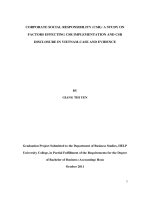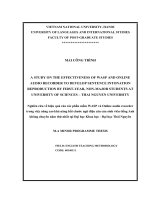CORPORATE SOCIAL RESPONSIBILITY (CSR) A STUDY ON FACTORS EFFECTING CSR IMPLEMENTATION AND CSR DISCLOSURE IN VIETNAM-CASE AND EVIDENCE
Bạn đang xem bản rút gọn của tài liệu. Xem và tải ngay bản đầy đủ của tài liệu tại đây (173.97 KB, 62 trang )
1
CORPORATE SOCIAL RESPONSIBILITY (CSR): A STUDY ON
FACTORS EFFECTING CSR IMPLEMENTATION AND CSR
DISCLOSURE IN VIETNAM-CASE AND EVIDENCE
BY
GIANG THI YEN
Graduation Project Submitted to the Department of Business Studies, HELP
University College, in Partial Fulfillment of the Requirements for the Degree
of Bachelor of Business (Accounting) Hons
October 2011
2
Declaration of originally and word count
DECLARATION
I declare that this graduation project is based on my original work except for
quotations, theories and citations which have been duly acknowledged. I also
declare that it has not been previously or concurrently submitted for any other
course/degrees at HELP University College or other institutions.
The word count is 10,220
Giang Thi Yen
Date:
3
ACKNOWLEDGEMENT
First of all, I would like to thank Dr. Pham Duc Hieu for his direction, assistance
and guidance throughout my project. He guides meaningful suggestions and
constructive ideas for me to complete this thesis.
Secondly, I special thank to all managers, employees and consumers of both
companies Long Tech Precision and NHABE Company in Vietnam. They helped
me a lot in completely survey about CSR awareness and its impact on the Vietnam
business nowadays. Without their co-operation, I could not be able to collect fully
information to support the research.
Finally, I would like to express my sincere to all my friends for their
encouragements and contributions which have been important for my presentation
of this project.
4
A STUDY ON FACTORS AFFECTING CSR IMPLEMENTATION
AND CSR DISCLOSURE IN VIETNAM
CASE AND EVIDENCES
BY
GIANG THI YEN
OCTOBER 2011
Supervisor: Dr. Pham Duc Hieu
Abstract
:
This project aims to examine how managers and employees from different
Vietnamese companies represent their knowledge and their perceptions of
Corporate Social Responsibility (CSR), also the behavior of Vietnamese
consumers towards CSR positive. The resulting framework based on an expansion
of qualitative research to clear the CSR performance of each situation. It also
provides evidence that there are large proportions of managers and employees
express a highly positive attitude towards CSR and its reporting but consumer’s
perception is rather low in statements and questionnaire. It stills a discrepancy
between what managers say they do and what action they do. However, the
willingness to learn and gain more understanding about CSR found from survey, it
will make the bright future of Vietnam CSR implementation and CSR disclosure.
5
Table of Contents
Declaration of originality and word count…………………………………………2
Acknowledgement…………………………………………………………………3
Abstract…………………………………………………………………………….4
Table of contents………………………………………………………………… 5
CHAPTER 1: INTRODUCTION……………………………………… 9
1.1 The important of research…………………………………………………….10
1.2 Problem statement…………………………………………………………….12
1.3 Objective of research…………………………………………………………12
1.4 Range of research…………………………………………………………… 13
1.5 Research methods…………………………………………………………….14
1.6 Structure of research………………………………………………………….15
CHAPTER 2: LITERATURE REVIEW………………………………… 16
2.1 Theory framework………………………………………………………… 16
2.1.1 What is CSR? 16
2.1.2 Stakeholder theory………………………………………………………….17
2.1.3 CSR implementation and CSR disclosure………………………………… 18
2.2 Research and Studies……………………………………………………….21
2.2.1 The factors effecting on CSR implementation and CSR disclosure……… 21
2.2.2 Business ethics in Vietnam…………………………………………………23
2.3 Research Summary…………………………………………………………25
6
CHAPTER 3: RESEARCH METHODOLOGY
………………………….26
3.1 Overview of Methodology………………………………………………… 26
3.1.1 Quantitative research…………………………………………………… 26
3.1.2 Qualitative research……………………………………………………… 27
3.1.3 Conclusion………………………………………………………………….28
3.2 Data collection…………………………………………………………… 28
CHAPTER 4: RESULTS AND ANALYSIS…………………………… 31
4.1 Results and discussion from survey……………………………………… 31
4.1.1 Sampling……………………………………………………………………31
4.1.2 Description of results……………………………………………………….33
4.1.3 Result from managements’ survey………………………………………….35
4.1.4 Results from employees’ survey…………………………………………….37
4.1.5 Results from consumers’ survey……………………………………………45
4.2 Summary…………………………………………………………………….48
CHAPTER 5: CONCLUSION AND RECOMMENDATION………….49
5.1 Conclusion………………………………………………………………… 49
5.2 Recommendation……………………………………………………………51
5.3 Limitations and Future Development…………………………………… 53
5.3.1 Limitations………………………………………………………………….53
5.3.2 Future Development……………………………………………………… 55
7
REFERENCES………………………………………………………………… 56
APPENDICES………………………………………………………………… 59
8
LIST OF FIGURES AND TABLES
Table 1: Age…………………………………………………………………… 33
Table 2: Gender………………………………………………………………… 34
Table 3: Position of people response…………………………………………… 34
Table 4: Distribution of manager survey towards statements…………………….36
Table 5: Descriptive statistics from manager’s survey………………………… 36
Table 6: Question 1 –Result and Analysis……………………………………… 39
Table 7: Question 2 –Result and Analysis……………………………………… 40
Table 8: Question 3 –Result and Analysis……………………………………… 42
Table 9: Question 4 –Result and Analysis……………………………………… 43
Table 10: Question 5 –Result and Analysis…………………………………… 45
Table 11: Distribution of consumer towards statements…………………………45
Table 12: Description statistics from consumer’s survey……………………… 47
9
LIST OF ABBREVIATIONS
CSR Corporate Social Responsibility
VCCI Vietnam Chamber of Commerce and Industry
WTO World Trade Organization
WBCSD World Council on Sustainable Development
PR Public Relations
NGOs Non Government Organizations
10
CHAPTER 1: INTRODUCTION
1.1 THE IMPORTANT OF RESEARCH
In the last 10 years, Corporate Social Responsibility (CSR) is a more concern in
the business world and a growing number of corporations that began to think
about their impacts on society, first and foremost because consumers became more
interested in corporate activities around the world. It is also the commitment of
one company to perform ethically and contributes an economic development at the
same time as improving the quality of life. Besides, corporate social responsibility
also creates a way of business responsibility to an extensive of the relationship
between stakeholders, shareholders and investors. This is the result of growing
requirement for corporate disclosure and increased customer demands. In the
recent survey, there is a lot of consumers reported having either rewarded or
punished companies based on their perceived social performance.
In particularly, Vietnam is one of the country which getting more awareness about
CSR in business. In 2005, Vietnam has a join of CSR towards the sustainable
development that set up by Vietnam Chamber of Commerce and industry (VCCI)
to payment the companies that actively implementation CSR in the international
economics. According to Mr. Nguyen Quang Vinh- depute director of the
enterprises for sustainable development consider “Enterprise of Vietnam need to
be backed implement CSR, manufacturing business toward sustainable
development is prerequisite, Vietnam’s enterprise survival in the context of
international economic integration”. There fore, through the award of business
11
social responsibility, it has many companies go to implement CSR and it will be
practiced more often as incentives for their business. At the same times,
enterprises for the officers of Sustainable Development- VCCI is committed to co-
administration of enterprises and always support and guide the implementation of
CSR companies to advance the competitive advantages of enterprises in the
integration process.
Furthermore, when Vietnam joint to the World Trade Organization (WTO) in
2007, CSR is also achieving more tended from business because of its important
role with the foreign customers and partners. Thus, CSR is one more essential
thing in success of business in Vietnam.
Besides, CSR is also the commitment of business to business ethics and develop
the economics, they ensure to improve the quality of life for employees and their
families, local society and the communities at large (World Council on Sustainable
Development – WBCSD). Thus, CSR become the main factor to consider in the
decisions of responsible investment as well. Business also gets other benefits such
as developing the relationship with the workers, productivity increases and their
employees will enhance attached to the companies.
1.2 PROBLEM STATEMENT
In the circumstance of Vietnam's accession to WTO, in addition to removing
tariffs, environmental laws that companies take and accomplish is the most
reasonable time to implement CSR. There are some enterprises having a highly
12
positive attitude towards CSR and it’s reporting, consumers’ perception is at low
state and questionable. However, the implementation CSR in Vietnam is quite
difficult because of misunderstanding of its important role. Therefore the problem
with Vietnam corporations is lacking of information and lead to confusion,
mismanagement in CSR applying. Understand the importance of this issue,
Vietnam’s company also more pay attention to improve the CSR implementation
and disclosure. In fact, the hypothesis testing shows that there seems to be a
discrepancy between what managers say they do and what they actually do. The
typical lesson recently is Vedan case in 2008 as one example. These scandals have
affected a lot on the developing of Vietnam enterprise in general. However, the
willingness to learn and gain more knowledge about CSR found from the survey
has drawn a bright future for CSR implementation and CSR disclosure in
Vietnam.
1.3 OBJECTIVE OF RESEARCH
In order to succeed in the implementation of CSR in Vietnam, business owners
should encourage the CSR for their employees to make a good relationship based
on belief and loyalty between them and enterprise. This research also gives more
cases and evidences to support the aims of research. Thus, it will be carried out
some of meaning objective to accomplish this research.
Firstly, the research will over view the basic concept and definition of CSR in
general and its effect on the business development. Because the essential of CSR
13
in business thus it seem to be a best way to contribute a good corporate reputation
and get profit. Therefore, this paper mention to the important of CSR and its role
in business in Vietnam. At the same time, this thesis also deals with the survey of
knowledge of Vietnam enterprises in CSR awareness. In particularly, the research
will represent theoretical model and inspect of factors effecting CSR
implementation and CSR disclosure in Vietnam business. This will be focused by
giving the cases and evidences as well as its effect on the Vietnam enterprises. At
the same time, the research also tends to improve the understanding of individual
business on CSR issues, impacting and its importance in developing circumstance.
Base on the quantitative analysis and overview of CSR implementation, the
research also gives the result analysis and conclusion.
Finally, the research gives recommendation and some future solutions for the
business to improve the perception and comprehension of CSR influence and
create the better performance.
1.4 RANGE OF RESEARCH
In the beginning of this research, author introduced that it is the new thread and so
difficult in Vietnam business studying of CSR. Therefore, it is focused on the
issue of factors that effect on the CSR implementation and CSR disclosure in
Vietnam. Also, the author will has logistic range in learning of its important in
development of business as well as give more specifically solutions. At the same
14
time, it also represents by some typical cases and evidence of Vietnam
Corporation to clear this issue.
Besides, the time duration of conducting the research will from July 25, 2011 to
October 17, 2011.
1.5 RESEARCH METHOD
Because growing force on many corporations to carry out of the responsibility in
to their activities that has resulted in a rising of large enterprises which starting to
the responsibility in to their activities that has resulted in an increasing number of
large corporations starting to forward the concept of Corporate Social
Responsibility (CSR). Due to the diversification of much previous research, the
purpose of this research was to achieve a better understanding of how the concept
of CSR is incorporated in operations and focus on how it describes, integrates, and
monitors CSR. In order to more clear the issue, the research will provide case
studies of TWO different companies in Vietnam. Besides, many documentations
and interviews were studied as a data collection method for this thesis. The
summaries are made from the findings that were the corporation working tends to
CSR, which is considered as a framework of a number of different circumstances,
and absolute new and therefore it’s not yet fully established. However, CSR is still
considered as an important part of the strategy’s activities. Further more, it was
concluded that the companies work with high CSR in a multi-functional through
different types of networks. The study also shows that there is little uniformity
15
between the business CSR monitoring and report systems. As a result, it’s
important for a general system that can facilitate a comparison of CSR efforts
internal companies.
Besides, base on primary data, the research distributes the interview and gives
questionnaire to study through Vietnam companies’ managers, officers and
consumers. This can be examined how they understand the CSR concepts and
what they know of its impact to the development of Vietnam enterprises. At the
same time, this is the fastest way and cheapest collection data without be sued by
any organizations. Furthermore, the information and any sources that use in this
research are complete from the secondary data such as internet, newspapers, or
something that author learning from teacher and library.
1.6 STRUCTURE OF RESEARCH
In order to more clearly when study this research, the author will show all chapter
in this part. It’s as well as more understand about the concept of CSR and its
importance in business of Vietnam companies. Specifically, the research has
created by five sections as following:
Chapter 1: Introduction
Chapter 2: Literature Review
Chapter 3: Research Methodology
Chapter 4: Result Analysis
Chapter 5: Conclusions and Recommendations
16
CHAPTER 2: LITERATURE REVIEW
2.1 THEORY FRAMEWORK
2.1.1 What is CSR?
With Vietnam development business to day, the concept of CSR is seems to be
vague in major of corporations. The facts there are a lot of definitions of CSR
which create by many authors and organizations. One of these definitions
describes “CSR as a capacity to make sustainable living”. It respects differences
culture and differences business opportunities in contribution of the employee’s
skills, the community and the government. However, the World Business Council
for Sustainable Development in its publication Making Good Business Sense by
Lord Holme and Richard Watts, they described the term of Corporate Social
Responsibility as “the continuing commitment of ethical and contribute to
economic development while improving the quality of life of the workforce and
their families as well as society at large”. In others vision, the traditionally define
of United States, “CSR is know more as in terms of philanthropic model”. The
firms make profits by achieve paying tax and then they share it to charitable
causes. However, the European model is more focused on operating the core
business in a socially responsible way, that base on investment decision for solid
business case reasons. On the other hand, the European Commission encloses with
two definitions into one concept whereby companies decide voluntarily to
contribute to a better society and a cleaner environment. That means it integrates
17
social and environmental concerns in their business operations and in their
interaction with their stakeholders on a voluntary basis.
In conclusion, even though there are many differences of norms from the many
studies or other sources, CSR still implement to improve the capacity of business
which motivates the firms to advance their competitive advantages, employee’s
belief and customers’ loyalty as well as the company’s performance.
2.1.2 Stakeholder theory
The concept of stakeholders is core of CSR implementation. In this theory, the
concept “stakeholders” refers to any group or individual who is influenced by the
action of the firms. It may be given by a wider perspective as simply all those
entities with a "critical eye" on corporate actors (BomannLarsen & Wiggen, 2004).
According to the stakeholders theory argues that there are other parties involved,
including governmental bodies, political group, trade associations, trade unions,
communities, associated corporations, prospective employees, prospective
customers, and the public at large. From the ethical perspective, organizations
must have an obligation to treat fairly among stakeholders (Deegan, 2009). This is
a dynamic activity, as expectations and pressure change and is further complicated
by the need for managers to resolve the interests of different stakeholders and to
decide it within the managerial decision making process. In the case of
stakeholder’s conflict of interest, business has duty to achieve balance between
them.
18
There are also various analyses and specifications of stakeholders are also
provided by the marketing literature. According to Morgan and Hunt (1994), they
put stakeholders in to four sectors that are including of internal, suppliers, buyers,
and lateral stakeholders.
In other hands, based on the Freeman’s theory, Baron (1995) had divided the
stakeholders into two groups, called market and non-market. The market group is
category in to customers, competitors, employees, partners, and suppliers.
However, the non market is NGOs, government, regulators, environmental safety
and standards organizations, media, society, or community. Both of them are
impacted of the different level of social responsibility pressures or motivations of
the company. There fore, many actions were taken by the companies that are
related to stakeholder’s expectations (Friedman and Miles, 2002). It also is
important to see that the concerning and satisfying the interest of stakeholders help
to improve corporate governance and accountability that includes stakeholder
communication and CSR reporting.
2.1.3 CSR implementation and CSR disclosure
CSR implementation and CSR disclosure could be considered as an organizational
change process to improve their performance and it seem to be a moving from a
present to a future state or known as a new way of organizing and working. CSR
practice of the company is aim to support the organization with the active
19
demands of the business and social environment through the classification and
management of stakeholder prospect.
In addition of view, CSR implementation relates to learning over time and the able
to appreciate the specific situation and confluence of stakeholder expectations.
Thus there is no best way to carry out of change developed learning of stakeholder
expectations and the specifics of the context that will help to make sure the
modification is beneficial and supported by appropriate mechanisms (Burnes,
2004).
In the historical overview of development in the CSR literature and from theory to
practice and associate versa, the ethical implications of CSR are ethics reoriented
to the center of management decisions and policies. It’s also honesty with
compliance or obligation and refers as the role of the leadership. Further more, the
level of implementation is affected by numerous factors that including the CSR
model-implementation keys, the principle’s instructional leadership, the measure
of teachers’ professional community, and the helpfulness of the CSR developers’
assistance. The change in implementation is linked with positive change in
principal’s instructional management.
In Vietnam, CSR implementation is consider as a strategic decision and a means
for authority and it bringing new business opportunities. According to Mr. Pham
Hoang Hai, Action Aid Programmed Officer in the North in charge of CSR said
that in fact “CSR practice is a tool for sustainable development that enterprises can
implement to add more to their economic benefits. The companies do their CSR
20
nowadays as it assures the business growth but not damage the environment and
not causing social inequalities”.
Because of joint as a full member of WTO in 2007, CSR practices in Vietnam will
enhance enterprises’ competitive advantages and carry out of the opportunities in
export productivities to foreign markets. Therefore, effective implementation of
CSR is an essential thing for the whole development of Vietnam enterprises. It
should be concern that Vietnam has a lot of challenges when implement CSR in to
business, it is difficult to assemble the demand of the community, of clients and
suppliers toward the industrial development.
In addition, a more important disclose from the government, in terms of public
policy related to CSR is starting to become apparent with indications of increasing
legislative activity in the areas of labour law, corporate governance and
environmental protection. This leading to demonstrated numerous companies can
effectively disclose corporate social responsibility (CSR) information to the
public, but in practice, reporting this type of information is fraught with legal and
ethical uncertainty often unexplored in most literature. The facts of there are many
companies have scandal with CSR disclosure in Vietnam today.
According to a recent of corporate survey, Vietnamese companies have
implemented corporate social responsibities as a mean of making their reputation
because of social demand changing nowadays. Besides, they also believe in
understanding and dealing with responsibility awareness that will get benefit for
their business. Therefore, due to accomplish business responsibilities, corporate
21
suggest that they have to do more other than compliance with legal requirements.
Companies also recognize that the interview on Corporate Social Responsibility
can have significant effects on their image and reputation.
As a result, Vietnam companies should actively establish their reputation to
compete. This can be achieved by making a new internal forces, new expectations
or requirements for the firms as well as the sectors into practical actions.
Therefore, it important to connect between companies with relevant parties and
includes the voice of the third party into the discussion for decision making
process.
2.2 RESEARCH AND STUDIES
2.2.1 The factors effecting on CSR implementation and CSR disclosure
Through the social improvement oriented programming, Corporate Social
Responsibility (CSR) refers to initiatives carry out by companies to develop their
public reputation. It is a measurement of ethical business management in which,
for instance, a company pays its workers a living salary, provides services that
protect the environment, and guarantee social and fiscal intelligibility to the
public. CSR typically involves specific company labors to get better social
relations and environments. In many situations, CSR of a company is valued by
different criteria and diversity presentation. However, there are three main factors
of CSR that may include.
22
First of all, it is business management factor that mean business executives who
have ability with social integrity encouragement, protect environment and business
intelligibility are more probable than others to support efforts. Even though if
there is an executive lacks true conviction, they may judge that CSR efforts can
advance the public image of their company and may even increase profit. Making
the competitive business advantages, they also pursue CSR programs simply to
develop the public image of the company and intimate more customers.
Secondly, according to Scholar Peter Weidman of the University Of New Hanover
said “situational conditions often entice companies into CSR measure”. That
means, the managers often respond to external conditions suggesting that the
community will prove sympathetic to CSR reforms. Social consider that direct the
company in a poor light may also make CSR efforts more attractive to a
corporation. At the same time, a company may pursue CSR when the same
industry competitors do so in order to gain better competitive advantage in overall
market.
Finally, it is the factors of ways that one business running to achieve a success.
According to the European Working Conditions Observatory suggests that
“business prosperity historically constructs CSR initiatives seem to be desirable”.
For instance, they consider that there are many companies with upwards of more
than 200 labors who likely understand of CSR and they can appropriate for their
enterprises. According to the European Working Conditions Observatory suggests
that business prosperity historically constructs CSR initiatives seem to be
23
desirable. In the recent study, having more companies are also more extremely to
have the available implementation of large social projects and they hire
consultants and experts’ who can advise for their CSR strategies. This as the result
of gain advantages with competition and construct their image on the public.
2.2.2 Business ethics in Vietnam
The study of ethics is a long traditional in society that refers as beginning of
religious, different cultural and philosophical belief. Ethics is considered with
Ethics is concerned with honorable duty, accountability and social justice. It is
influenced by number of characters of the personality as well as the characters of
business firms that is gathering of human being. The simplest knowing definition
is business ethics are considered as accepted principles of right or wrong,
governing the conduct of business people. As well as other concept of the business
ethics, it refers to all the rules, standards, ethics or laws to give information on
performance and fact principles in certain cases.
In circumstance, business ethics is still moderately new issue in Vietnam for both
businessmen and academic people. In a command of economic system, all
business activities were conducted by government orders. Through such orders,
ethical conduct was considered as completely obeying the higher authorities’
instructions. At that time, industry in Vietnam was not strong and there were also
limited number of manufactures and furthermore nearly all of them were state
owned thus there was no need to consider such issues as trademark or intellectual
24
property rights. However, since Vietnam has jointed in Internationalization from
1991, there was new issues coming up such as rational property rights, food safety
regulations, strikes, stock market and thus the issue of business ethics became
trendier to society.
In aspect of this issue, CSR is just focus on the quality of goods and environment
problem in business. It provides the clues to make obvious for potential of
production that is influenced on the decision of clients. For example of given the
recent food safety scandal in China, consumers are demanding healthy and safe
products, first and foremost. Whereas the present of environmental protection in
second position denotes greater environmental awareness, it also shows that
Chinese consumers value products’ green credentials as guarantee of good quality
and safety, the same way that management integrity appears obviously as a sub-set
of quality, safety and environmental concern.
CSR is important in business ethics and this issue becomes the main factor that
makes the enterprises succeed. Therefore, Vietnam companies should be more
concern about the CSR problem in companies not only increase competitive
advantages with others but also support from government and improve their
reputation in public. This lead to the success of encourages developing business
ethics for themselves and raising the benefits of stakeholders.
25
2.3 RESEARCH SUMMARY
In the face of the growing consequence of CSR, there is small concurrence as to
what it really meaning and there are many different names for the same or similar
concept, such as Corporate Social Responsibility, Corporate Citizenship, Business
Sustainability and Corporate Responsibility. Base on the several of summaries,
this research is given small aspects of CSR definition and its important role. They
all pointed towards the same fundamental principle that a company is responsible
for providing more benefits. It has a role to play in treating its employees well,
preserving the environment, developing sound corporate governance, supporting
philanthropy, fostering human rights, respecting cultural differences and helping
to promote fair trade, among others. All of these are meant to have a positive
impact on the communities, cultures, societies and environments in which
companies activate.
What’s more, the search also classifies different presenting the literature
framework of corporate social responsibility in the main point of CSR concept,
CSR concerns, and practices in Vietnam companies.
In common sense, this research also tends to the awareness of Vietnam business in
CSR and how to develop it in nowadays. Even though there are a lot of limitations
but only a few studies in Vietnam focus on factors affecting on CSR practices and
it’s reporting which this study attempts to address.


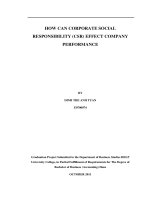
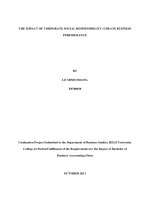
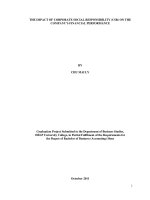
![gherghina et al - 2014 - a study on the relationship between cgr and company value - empirical evidence for s&p [cgs-iss]](https://media.store123doc.com/images/document/2015_01/02/medium_JKXoRwVO1T.jpg)

